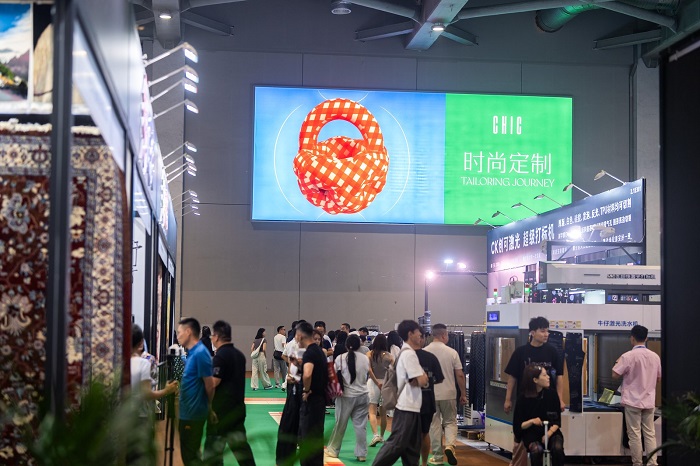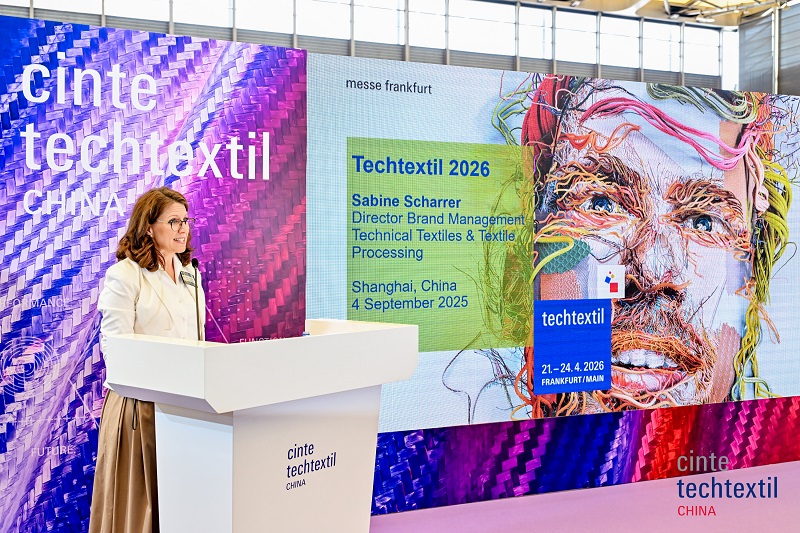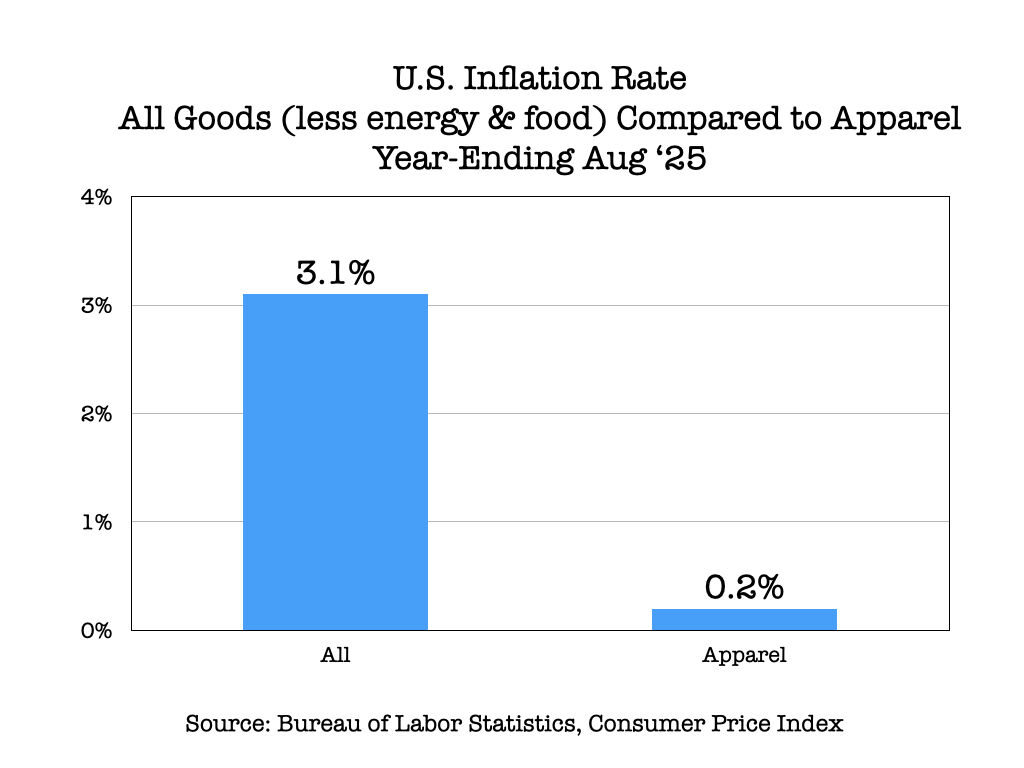FW
American & Efird (A&E), the US-based manufacturer of sewing threads and industrial yarns, has introduced REPEL, an advanced water repellency enhancement, which can be applied to the company’s sewing threads.
The new feature can enhance the functionality of backpacks, footwear, athletic wear, uniforms, and workwear. It is pertinent to mention here that the enhancement will not, in any case, affect the color of the product.
REPEL is compatible with Perma Core, D-Core, Wildcat Plus, Perma Spun and Excell product lines as well as other apparel and non-apparel thread and specialty yarn products which the company manufactures.
REPEL has been tested on seam and meets rain test method, moreover, free of perfluorocarbons (PFC-free), the REPEL feature will have A&E’s PFCZERO certification. PFC gases are considered to be one of the reasons for global warming.
Yiwu Tex is being held in China, May 17 to 19, 2018. The show has gathered more than 280 exhibitors showcasing innovative and diverse textile machinery and technologies. The four thematic zones in Yiwu Tex 2018 cover knitting and hosiery machinery, sewing and automatic garment machinery, textile printing industry and knitting products.
A variety of high-tech and productive machinery and technologies, stretching over upstream and downstream of the whole industrial supply chain across textiles, knitting, garments and printing, is being shown to international buyers.
Serving as an information exchanging and networking platform with markets trends unveiled and analyzed, Yiwu Tex 2018 leads the textile and garment industry to a smart and sustainable development.
Compared with some other large scale textile machinery exhibitions, Yiwu Tex is relatively more specialized and visitors are more concentrated.
Among the product groups are braiding machines, embroidery machines, engine components, fabrics, fiber, knitting machines, looms, material handling systems, packaging, sewing machines, spinning machines, textile dyeing machinery, textile machinery, textile printing machines, threads, yarn.
Besides health textiles, the exhibition also focuses on introducing intelligent production, smart management as well as advanced automatic technologies and equipment with the aim of helping industry players with their transition from traditional production to smart production.
Uganda’s cotton output in the 2017-18 season rose by a third after higher prices the previous year encouraged farmers to plant more.
Production has been the highest since the 2011-12 season before drought and lower prices cut yields. While harvesting is complete, ginneries are still processing the crop and marketing will continue until the end of September.
Uganda is East Africa’s second-biggest cotton grower. Companies such as UK-based Plexus Cotton are supporting smallholder cotton farmers in the East African nation to boost yields.
A positive trajectory is anticipated for production in the coming season.
Cotton, tea and tobacco are major exports in the nation that’s also Africa’s biggest shipper of coffee beans. Uganda ranks behind Tanzania as the region’s largest cotton producer.
Uganda is the only country in the world that grows one variety of cotton, the long-stapled Bukalasa Pedigree Albar. This focus on one type ensures uniformity and easier quality control measures in producing lint and yarn. Currently cotton is cultivated in about 1,00,000 hectares.
Uganda’s cotton has found favor with textile importers in Germany, Denmark and other European countries.
Ninety per cent of Uganda’s cotton is exported. Cotton production in Uganda is entirely rain-fed.
Trevira is investing in equipment for processes like polycondensation, spinning, and textile processing. These will enable Trevira to produce filament specialties for the textile industry.
Trevira, owned by Indorama Venture, is an innovative European manufacturer of high-value branded fibers and filament yarns for technical applications and hygiene products as well as for home textiles, automotive interiors and functional apparel. Its two production sites and a marketing and sales office with about 1100 employees are located in Germany, supported by an international marketing and sales organization. The filament yarns are made in its German spinning mills from pre-consumer and post-consumer recycled polymers derived from PET bottles supplied by its parent company.
The company joins several fiber manufacturers that have created a range of branded recycled polyester fibers and is looking to capitalize on the overall heightened demand for more sustainable synthetic materials.
As an industrial enterprise, Trevira has long advocated for the recycling of valuable raw materials and waste products. The company spins regranulate made by Indorama from bottle flakes into filament yarns consisting of 100 per cent recycled material and recycled chips. Fibers and filaments from Indorama bear the GRS and RCS-NL certification marks. Alongside technical applications, they are used in the automotive and apparel sectors, with other applications in development.
Cotton Council International is a non-profit that promotes US cotton fiber and manufactured cotton products with its Cotton USA mark.
With more than 60 years of experience, CCI’s mission is to make US cotton the preferred fiber for mills, manufacturers, brands, retailers and consumers.
While cotton has long been understood as a high-quality, reliable fiber, this is particularly true for US cotton, which doesn’t have the same quality and pest issues as other major cotton producing countries.
The US cotton industry has specific goals to be achieved by 2025. These are: reducing the amount of land needed to produce a pound of cotton fiber by 13 per cent; reducing soil loss by 50 per cent in balance with new soil formation; increasing water use efficiency by 18 per cent; reducing greenhouse gas emissions by 39 per cent; increasing soil carbon in fields by 30 per cent; and reducing energy to produce seed cotton and ginned lint by 15 per cent.
Consumers are becoming more aware how everyday choices impact the world around them. Fast fashion has made a big contribution to the rise of synthetic, manmade fibers that are cheap to manufacture, though not easily recycled. Synthetic fibers such as polyester and acrylic damage the environment by releasing hundreds of thousands of tiny synthetic particles in every wash.
An association of spinning mills in Tamil Nadu undertakes counseling sessions for workers. The association represents more than 650 mills.
The counseling sessions will help the young talent of the textile industry to release their work-related stress and deal better with the situation. They are also being encouraged to report harassment at the workplace.
Dindigul has set up a sanitisation workshop to help improve the conditions in up to 200 spinning mills.
Garment and textile workers in the textile hub of south India face severe pressures of work, trauma, ill-treatment and sexual harassment.
The workforce, majorly represented by young women, is compelled to work for long hours and forced to live in unauthorised hostels. There have been a series of deaths in textile factories and hostels. In the last three months, 23 such deaths were reported in Tamil Nadu. Many of these workers live away from their homes to earn a livelihood and support their families.
Tirupur and Erode districts, collectively known as the Textile Valley of India, where the bulk of the industry is located, have reported ten deaths.
Often death cases are not investigated and the cause remains uncertain. Families say among the dead are those who have ended their lives.
Nigeria is strengthening the competitiveness of the cotton value chain through enhancing capacities of stakeholders, developing and improving market infrastructure, providing jute bags to prevent polypropylene contamination, improving and upgrading ginneries and extending services/training of farmers and farmers’ empowerment.
The investment climate and the fiscal regime will be removed. Tax on equipment and inputs will be removed. An industry wide tax holiday will be applied.
The development of the sector will be fast tracked across the entire value chain. Capacity building and skills development will be attended to. An export promotion strategy will be devised.
Over 20 tons of certified cotton seeds as well as 1.5 tons of foundation seeds will be released to cotton farmers in the country for the farming season.
The textile industry was one of the booming sub-sectors of the Nigerian economy in the post independence years.
Driven by locally grown cotton and with a huge demand for clothing by a fast growing population, it provided direct and indirect employment to hundreds of thousands of Nigerians for several decades.
Between 1985 and 1991, Nigeria’s textile industry recorded an annual growth of 67 per cent. In that period textile companies numbered around 180, employing about a million people, and accounting for over 60 per cent of the textile industry capacity in West Africa.
For the first quarter The Children’s Place net sales fell 0.1 per cent. Comparable retail sales decreased 1.8 per cent. Adjusted operating income in the first quarter of 2018 was 5.8 per cent of net sales.
Gross margin rate in the quarter was also negatively impacted by the increase in penetration of the digital business to 26 per cent from 23 per cent last year. The company’s digital business operates at a lower gross margin rate due to higher fulfillment costs but is accretive to operating margin. The negative comp also resulted in deleverage of fixed expenses.
Gross margin rate was positively impacted by the reclassification of certain items due to the new revenue recognition rules.
The Children’s Place is the largest pure-play children’s specialty apparel retailer in North America.
Adjusted operating income in the first quarter of 2018 was 5.8 per cent of net sales, deleveraging 530 basis points compared to last year. Adjusted tax rate was negative for the quarter versus positive 25.7 per cent last year, primarily due to the impact of the accounting rules related to the income tax impact on share base compensation and the impact of the lower corporate tax rate.
The company closed 12 stores and did not open any stores during the first quarter of 2018.
Maria Borromeo is president of Hudson Jeans. She brings strategic leadership and experience with a record of success of growing and presiding over a brand from its inception.
Hudson Jeans belongs to the Differential Brands Group, which has a portfolio of other global consumer brands like Robert Graham and SWIMS.
Under Maria’s leadership, the company looks forward to maximizing the growth potential for Hudson not only through the implementation of a strategic vision that aligns with the core Hudson culture and values, but also capitalizing on new product and marketing initiatives and strengthening the brand’s digital and direct-to-consumer strategy.
Prior to joining Hudson, Borromeo was the co-founder and CEO of Thakoon, a global luxury brand. Borromeo successfully led all aspects of the business’s development, culminating in its acquisition and shift to a direct-to-consumer model. Borromeo devised and executed the long-term strategic vision for the brand while creating significant value by driving a steady and consistent growth trajectory. Borromeo has also worked with other leading global brands including Alexander McQueen and Etro.
Gerber Technology delivers industry-leading software and automation solutions that help apparel and industrial customers improve their manufacturing and design processes and more effectively manage and connect the supply chain, from product development and production to retail and the end customer.
Its digital solutions include the Yunique PLM product lifecycle management software as well as AccuMark, the industry-leading pattern design, grading, marker making and production planning software.
The digital solutions architecture uses common file structures. Data can easily be passed to the cut room where smart machines, like the Gerber spreader XLs series and the Gerber Paragon line of multi-ply Gerber cutters, can process the order with a simple barcode scan.
The Z1 single-ply cutter with Contour Vision performs automated vision-aided cutting. An automated scan-to-cut system processes rolls of custom printed textiles by automatically generating cut files to drive the process. The Z1 is enabled with Gerber connect, which allows data to be transferred to the cloud and service professionals to diagnose the cutter in real time ensuring maximum production efficiency.
Gerber aims at highlighting how digitisation can make purchase-activated manufacturing and mass customisation a reality. Manufacturers can digitise their process and increase their overall efficiency, while also reducing their inventory without impacting customer satisfaction or quality.












